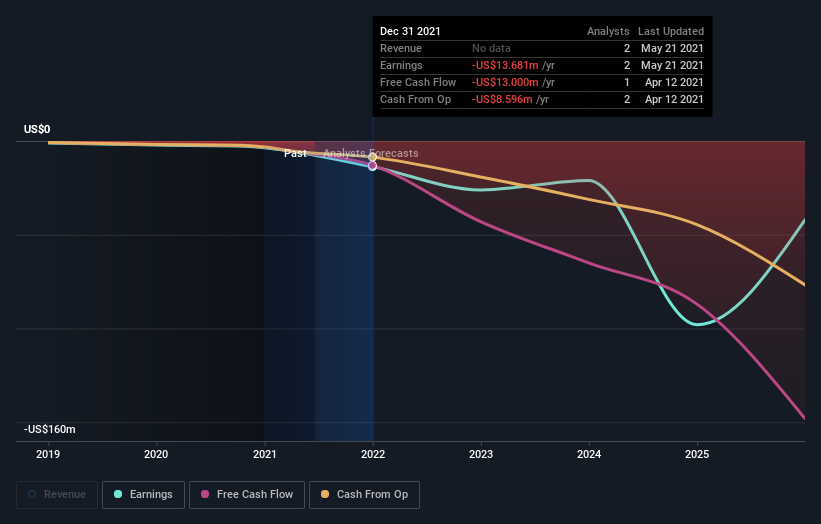What Percentage Of Gain Therapeutics, Inc. (NASDAQ:GANX) Shares Do Insiders Own?
A look at the shareholders of Gain Therapeutics, Inc. (NASDAQ:GANX) can tell us which group is most powerful. Insiders often own a large chunk of younger, smaller, companies while huge companies tend to have institutions as shareholders. I quite like to see at least a little bit of insider ownership. As Charlie Munger said 'Show me the incentive and I will show you the outcome.
Gain Therapeutics is a smaller company with a market capitalization of US$126m, so it may still be flying under the radar of many institutional investors. In the chart below, we can see that institutions are noticeable on the share registry. We can zoom in on the different ownership groups, to learn more about Gain Therapeutics.
View our latest analysis for Gain Therapeutics
What Does The Institutional Ownership Tell Us About Gain Therapeutics?
Institutions typically measure themselves against a benchmark when reporting to their own investors, so they often become more enthusiastic about a stock once it's included in a major index. We would expect most companies to have some institutions on the register, especially if they are growing.
Gain Therapeutics already has institutions on the share registry. Indeed, they own a respectable stake in the company. This implies the analysts working for those institutions have looked at the stock and they like it. But just like anyone else, they could be wrong. If multiple institutions change their view on a stock at the same time, you could see the share price drop fast. It's therefore worth looking at Gain Therapeutics' earnings history below. Of course, the future is what really matters.
We note that hedge funds don't have a meaningful investment in Gain Therapeutics. Because actions speak louder than words, we consider it a good sign when insiders own a significant stake in a company. In Gain Therapeutics' case, its Top Key Executive, Khalid Islam, is the largest shareholder, holding 7.4% of shares outstanding. With 7.2% and 6.1% of the shares outstanding respectively, Tiventure S.A. and Shawn Titcomb are the second and third largest shareholders. Additionally, the company's CEO Eric Richman directly holds 1.8% of the total shares outstanding.
Our studies suggest that the top 19 shareholders collectively control less than half of the company's shares, meaning that the company's shares are widely disseminated and there is no dominant shareholder.
Researching institutional ownership is a good way to gauge and filter a stock's expected performance. The same can be achieved by studying analyst sentiments. There is some analyst coverage of the stock, but it could still become more well known, with time.
Insider Ownership Of Gain Therapeutics
The definition of company insiders can be subjective and does vary between jurisdictions. Our data reflects individual insiders, capturing board members at the very least. Company management run the business, but the CEO will answer to the board, even if he or she is a member of it.
I generally consider insider ownership to be a good thing. However, on some occasions it makes it more difficult for other shareholders to hold the board accountable for decisions.
It seems insiders own a significant proportion of Gain Therapeutics, Inc.. It has a market capitalization of just US$126m, and insiders have US$24m worth of shares in their own names. This may suggest that the founders still own a lot of shares. You can click here to see if they have been buying or selling.
General Public Ownership
The general public -- including retail investors -- own 57% of Gain Therapeutics. This level of ownership gives investors from the wider public some power to sway key policy decisions such as board composition, executive compensation, and the dividend payout ratio.
Private Equity Ownership
With a stake of 7.2%, private equity firms could influence the Gain Therapeutics board. Some investors might be encouraged by this, since private equity are sometimes able to encourage strategies that help the market see the value in the company. Alternatively, those holders might be exiting the investment after taking it public.
Next Steps:
It's always worth thinking about the different groups who own shares in a company. But to understand Gain Therapeutics better, we need to consider many other factors. For instance, we've identified 3 warning signs for Gain Therapeutics (1 is significant) that you should be aware of.
Ultimately the future is most important. You can access this free report on analyst forecasts for the company.
NB: Figures in this article are calculated using data from the last twelve months, which refer to the 12-month period ending on the last date of the month the financial statement is dated. This may not be consistent with full year annual report figures.
This article by Simply Wall St is general in nature. It does not constitute a recommendation to buy or sell any stock, and does not take account of your objectives, or your financial situation. We aim to bring you long-term focused analysis driven by fundamental data. Note that our analysis may not factor in the latest price-sensitive company announcements or qualitative material. Simply Wall St has no position in any stocks mentioned.
Have feedback on this article? Concerned about the content? Get in touch with us directly. Alternatively, email editorial-team (at) simplywallst.com.

 Yahoo Finance
Yahoo Finance 

